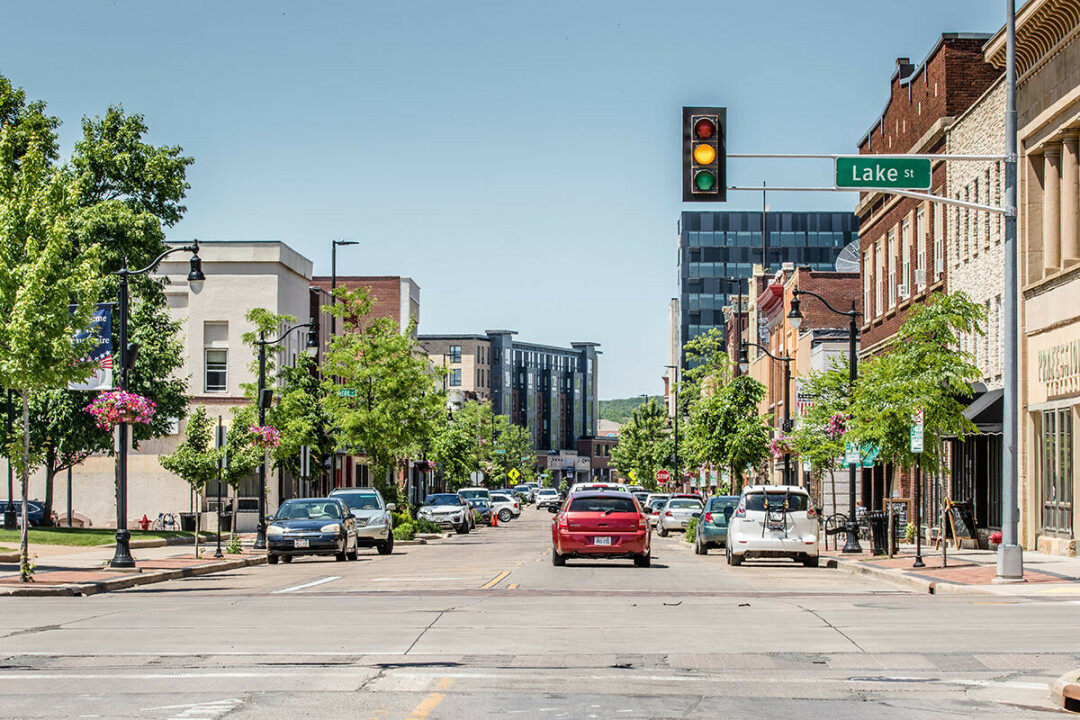NO CHANGE, NO CHARGE: City Nixes On-Street Parking Fees Until at Least 2025
E.C. businesses criticized plan to charge for on-street parking downtown
Tom Giffey, photos by Andrea Paulseth |

Plans to charge for on-street parking in downtown Eau Claire have been put on hold – at least for now. The City of Eau Claire’s preliminary plans to move from free parking with a two-hour limit to a system in which drivers would pay through an app or on-street kiosks was met with criticism from business owners at a recent meeting of the North Barstow Business Improvement District Board. At the time, the city was considering putting together a parking plan as part of the 2024 city budget, which the City Council is expected to approve in November.
However, City Engineer Dave Solberg told downtown stakeholders on Aug. 25 that the drive for paid parking would be put on the back burner until at least 2025.
“Following months of outreach to, and input from, local businesses downtown regarding the potential of paid on-street parking, the city plans to not include the paid on-street parking proposal in the 2024 operating budget,” Solberg wrote in an email. “City staff plans to continue the ongoing discussions with businesses over the next year regarding paid on-street parking. The implementation date of a paid on-street parking program is anticipated to be no sooner than January 2025.”
In an interview, Solberg said the impetus for discussing paid parking downtown stemmed from a Comprehensive Downtown Parking Study commissioned by the city in 2019. The final study from a Florida-based engineering firm, WGI Inc., was received in 2020, but the implementation of its recommendations was delayed because of the pandemic, Solberg said.
“Following months of outreach to, and input from, local businesses downtown regarding the potential of paid on-street parking, the city plans to not include the paid on-street parking proposal in the 2024 operating budget.”
DAVE SOLBERG
EAU CLAIRE CITY ENGINEER
The study was an update to a report prepared in 2015 based on 2014 data when parking use downtown was light. Solberg said that earlier study recommended that the city provide free two-hour parking on the street but charge for public surface lots that were close to downtown.
In the intervening years, both the Pablo Center at the Confluence and the Lismore Hotel opened, which led to much higher use of on-street parking. As a result, the recent study recommended beginning to charge for on-street parking as a way of encouraging turnover of vehicles as more people come and go from downtown, Solberg said.
The study also recommends using revenue generated from parking fees to pay for dedicated parking enforcement staff, Solberg added. Currently, the city has only a part-time parking administrator and several community service officers who may be called away from parking duties to handle other matters. Additional funds generated could also be used to revamp existing parking ramps and lots and to improve the city’s parking website, he said.
However, feedback to the city was consistent that downtown businesses would prefer free two-hour parking to continue in the foreseeable future. The Leader-Telegram quoted Julia Johnson – a partner in Pablo Properties and chairwoman of the North Barstow BID – saying that paid parking “would be horrible for business in our district… Businesses will move; businesses will fail.”
Solberg noted that parking in the two downtown municipal parking ramps is 50 cents an hour, meaning someone could dine at a downtown restaurant and see a show at the Pablo Center while paying just $2 for parking.
“If you go to the Twin Cities, go to a baseball game, you’re paying probably $20 for parking for the same amount of time,” Solberg said. “So our ramps are a good deal but people in Eau Claire still like that on-street parking.”
Solberg added that he expected to continue to meet with downtown businesses to discuss the subject.
“Parking is a very emotional topic whether it’s in the neighborhoods or whether it’s in the business district,” he said. “It is something that we’re going to try to have thoughtful and collaborative discussions with the business community to try and come up with a win-win for all the parties involved.”



















